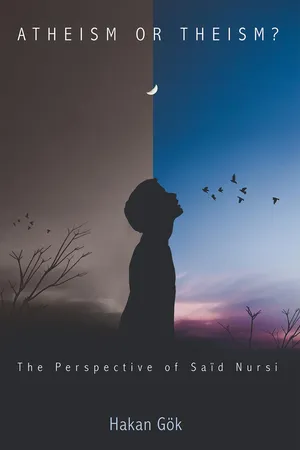![]()
1
Theism and Atheism
Historical Background
Introduction
In the philosophy of religion, five theistic arguments among many stand out as defending the existence of God. Before focusing on Saïd Nursi’s philosophy, we begin by setting out the existing basis of theism and atheism. Although there is no evidence that monotheism existed in ancient Greece, and we are mainly concerned with the God of monotheism, the thoughts of the ancient Greek philosophers are still considered, owing to their philosophical significance for and influence upon later monotheism. The theistic arguments to be examined in this chapter are: the ontological arguments; the cosmological arguments; the teleological arguments; the arguments from morality and conscience; and the arguments from miracles and religious experience. The main criticisms that may be leveled at each of these arguments are also examined.
Concept of God
The ontological meaning of the concept of God—the creator and ruler of the universe and source of all moral authority; the Supreme Being with regard to knowledge (omniscience), power (omnipotence), and extension (omnipresence)—seems to be accepted by all Abrahamic religions. The concepts of God in philosophy and in religion are interwoven. Although the existence of a Supreme Being is widely accepted in philosophy and religion, there are certainly different versions of God throughout history and across religions.
The Ancient Greeks
The ancient Greeks dealt with the concept of God at an early stage of their known history. Plato and Aristotle both consider God to be the crafter of the universe and of uncreated matter. Plato does not subscribe to the idea of monotheism, that is, one Supreme Being. He observes the planetary movements and concludes that there must be supreme powers behind all these celestial events. There is clear evidence that Plato believed in the existence of gods (hoi theoi) rather than of God (ho theos). To him, different gods are responsible for different events. This is also evident in ancient Greek literature, where there are mentions of gods such as Zeus, Prometheus, Aphrodite, and Athene.
Aristotle’s description of God as unmoved mover is different from that of Plato. To Aristotle, God’s divine existence is apparent through perfection and change in the universe. Aristotle perceives God as the detached transcendent demiurge, the highest being, the apex of knowledge and uncreated matter—but not necessarily as loving.
Plotinus also accepts the existence of God with different qualities. He claims that God is the source of the universe: that is, the universe comes out of God (ex deo) in a timeless process. He rejects creation, since this would imply consciousness and will, which limits God. For Plotinus, God is Most Virtuous and Most Truthful.
Ashqar makes the criticism that the gods of the ancient Greeks are like normal people. They have gender (e.g., Zeus is male and Aphrodite female), they have weaknesses, and they have emotions. He writes:
Ashqar, therefore, concludes that the ancient Greek concept of God is fundamentally in contradiction with that of monotheism, especially Islam.
The Jews
The concept of God in Judaism is very similar to that of Islam. Maimonides’ thirteen principles of faith describe the Jewish God openly. The essential qualities of the Jewish God, according to Maimonides, are as follows. God exists; God is one; God is incorporeal; He has no body; He is non-physical; God is eternal, that is, He has no beginning or no end; He transcends time; God is omnipresent, omniscient, and omnipotent; God will reward good and punish evil. Ashqar argues that the Jews deviated from the true tawḥīd (Oneness of God), and descended to the level of idolatrous concepts like that of the ancient Greeks.
The West
Western concepts of God have developed around Greek and Islamic philosophy. Like the ancient Greeks, the Christian West has divided opinions about God. Early Christians such as Tertullian (160–220) rejected Greek philosophy on the basis that it professed a number of unworthy views, whereas American Lutheran Christian scholar Martin E. Marty (1928–) believed that Christianity is compatible with the highest in Greek thought.
Augustine of Hippo (354–430) developed a theme similar to that of Plato, Socrates, and Zeno. His definition of God is: “something than which nothing more excellent or sublime exists.” He lives in the highest sense, and is the most powerful, most righteous, most beautiful, most good, most blessed. According to Augustine, God did not have to create, but did so as an act of love. However, Augustine disagrees with Socrates as regards whether the greatest being (i.e., God) must be aware only of himself. Augustine says that God created men and all creatures, and incarnated in Christ in order to be revealed to them.
St Anselm (1033–1109) employed the concept of “perfect being,” making it the foundation of his ontological argument. To Anselm, God is the highest being, under which there are lesser and lesser beings.
Thomas Aquinas (1225–74) believed that the knowledge of God could be obtained through reason and revelations. In this respect, he seems to be in agreement with Aristotle and many other Christians of his day. Although he accepts the gradation of form and matter, he claims that God is non-material, but has pure intelligence and activity. Aquinas’s God is a God of Love, and providential.
During the Enlightenment, deism, which regards reason as the only source of knowledge, emerged as a new form of theism. Physicists such as Kepler, B...
